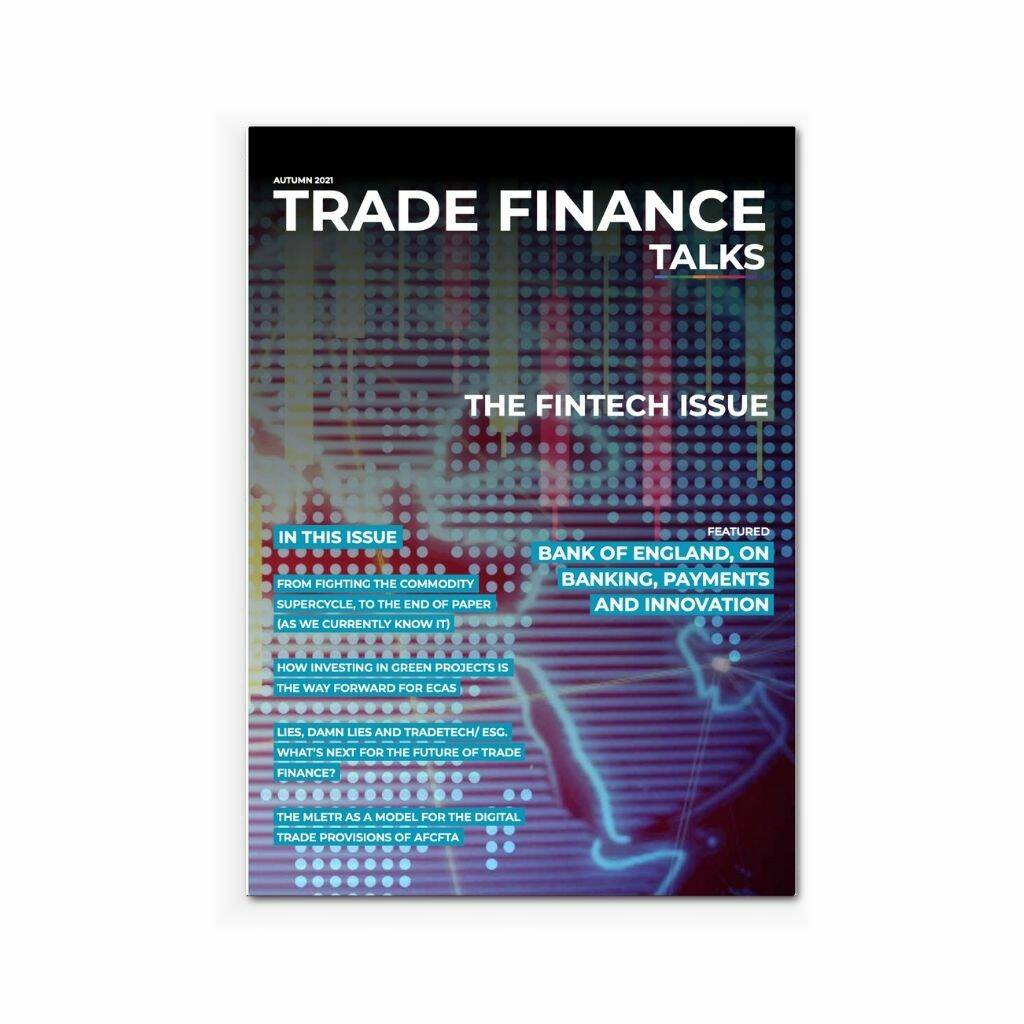LONDON, October 18, 2021. Trade Finance Global released its spring issue of Trade Finance Talks entitled ‘The Fintech Issue’.
Read Trade Finance Talks online (free)
Editor’s Note
The number ’13’ is often synonymous with bad luck. It’s considered unlucky to have 13 friends at a dinner party; many buildings don’t have a 13th floor; and many avoid buying a house or getting married on the 13th of the month. This issue of Trade Finance Talks, also coincides with the 13th ICC Trade Register – the world’s most comprehensive record of trade finance data across four different trade products, representing 28% of global traditional trade finance flows. Did the figures represent bad luck – following what was a golden streak of decreasing default rates in trade, increasing trade volumes, and a fairly upbeat trajectory for trade finance?
We’d say quite the opposite.
As reflected in both this issue and in the 2021 ICC Trade Register, despite record demand and supply-side shocks for global trade over the past 15 months, a rebound is underway. The COVID -19 pandemic, and also non-related events such as the Suez Canal blockage, have accelerated decades-long attempts to digitalise trade in a matter of months. The ICC Trade Register once again affirmed the low-risk nature of trade finance as an asset class, which gives hope to continued investment into this real-economy sector. The resilience of trade finance has fared well in the midst of the pandemic, thanks to unprecedented fiscal support from governments, changes to old operational processes in trade, and the ability to innovate and transform global supply chains.
But we’re not quite there yet.
With an estimated 4 billion paper documents lodged in the trade system and a $3-5 trillion USD trade finance gap (which has doubled since the publication of our first ever Trade Finance Talks magazine), MSMEs have found themselves in quite a difficult situation. What’s more, trade and supply chain finance enters the limelight for the wrong reasons: fraudulent misuse of payables techniques, and plenty of fingerpointing around the unsustainable nature of trade.
In this issue of Trade Finance Talks, we cover the acceleration of trade digitalisation, taking a deep dive into commodities, transport, and the role of trade finance in financing the green transition. We also celebrate the second year of our International Trade Professionals Programme, which has helped a cohort of trade professionals advance their careers in this sector, and have featured their winning articles in a dedicated section of this magazine.
As I write this foreword, en route to my first ever physical trade conference since February 2020 (thanks ITFA!), I step out of virtual land (picturing the brilliant, futuristic FCI conference overleaf), realising that we are currently at a big inflection point. It’s important to remember what we’ve achieved in the past 15 months, in terms of rapidly advancing global trade, a 3000- year-old industry that once relied on IOUs written on Mesopotamian clay tablets. However, we must not forget about the need to address the widening of the trade finance gap, the fragility of global supply chains, and the severity of the climate crisis. Let’s not go backwards, now that we’ve laid out the foundations.
Once again, we thank all of our sponsors, associations and partners for their never-ending support to Trade Finance Global.
Deepesh Patel
Editorial Director, Trade Finance Global
Welcome to our Autumn Edition of Trade Finance Talks by TFG: The Fintech Issue
We thank our contributors, partners and sponsors for making Trade Finance Talks happen.
What’s inside this Issue?
[display-posts image_size=”medium” wrapper=”div” wrapper_class=”display-posts-listing grid” meta_key=”_thumbnail_id” category=”autumn-2021″ include_excerpt=”false” posts_per_page=”22″]






















